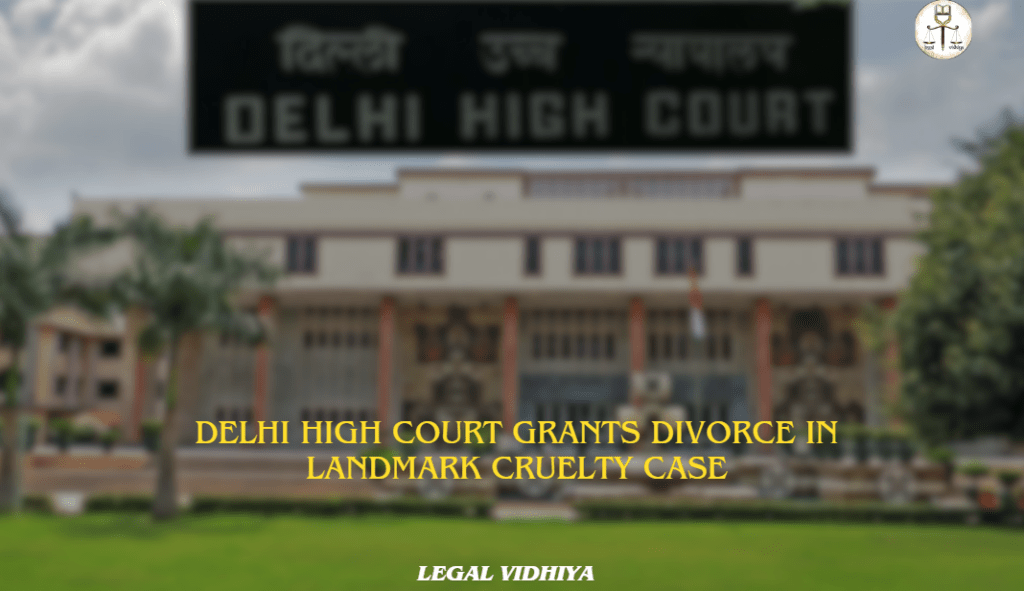
In a significant legal development, the Delhi High Court, in a judgment pronounced on January 9, 2024, granted divorce in the case of Matrimonial Appeal (Family Court) No. 37/2022. The case involved Ms. Payal Sethi as the appellant and Mr. Rohit Sethi as the respondent, with Justice Suresh Kumar Kait and Justice Neena Bansal Krishna presiding over the bench.
The appeal, filed under Section 19 of the Family Court Act, 1984, read with Section 28 of the Hindu Marriage Act, 1955, challenged the judgment of the Additional Principal Judge, Family Court, dated December 8, 2021. The initial judgment had granted divorce to Mr. Rohit Sethi on the grounds of cruelty, as per Section 13(1)(ia) of the Hindu Marriage Act, 1955.
The matrimonial dispute traced its roots back to the marriage of the couple on March 8, 2007, marked by a dowry-less ceremony according to Hindu customs. The union produced a daughter on November 12, 2007. The appellant, Ms. Payal Sethi, contended that four months into the marriage, she was accused of abandoning the matrimonial home, and subsequent events led to a criminal complaint against her.
Allegations surfaced regarding a false criminal complaint and a subsequent withdrawal, indicating a tumultuous relationship between the parties. The respondent, Mr. Rohit Sethi, filed for divorce citing cruelty under Section 13(1)(ia) of the HMA, 1955, asserting that the appellant’s actions, including a suicide attempt and false complaints, constituted cruelty.
The court, in its detailed judgment, analyzed the evidence presented by both parties. It noted the withdrawal of a petition under Section 11, where the appellant alleged the respondent’s prior marriage. Lack of evidence supporting this claim was a crucial factor. The court also considered a stolen dowry car incident that led to civil and criminal cases against the respondent, contributing to the overall acrimony in the marriage.
The appellant’s suicide attempt and the subsequent writing of a suicide note played a pivotal role in the court’s analysis. The court highlighted that such actions, coupled with threats and false complaints, amounted to cruelty. Legal precedents were cited to emphasize that filing false complaints and initiating criminal trials against a spouse constitute mental cruelty.
The judgment acknowledged the turbulent nature of the marital relationship, with separation in 2007 and subsequent attempts at reconciliation. Despite ten months of cohabitation during the two-year marriage, the appellant’s actions caused significant distress to the respondent, justifying the grant of divorce.
The court concluded that the learned Additional Principal Judge, Family Court, had correctly held that the respondent was subjected to cruelty by the appellant, leading to the grant of divorce under Section 13(1)(ia) of the HMA. The appeal was dismissed, affirming the decision of the Family Court.
This landmark judgment reinforces the legal precedent that false complaints, suicide threats, and criminal litigation against a spouse can be deemed as mental cruelty, providing grounds for divorce. The case sheds light on the complexities surrounding marital disputes and underscores the importance of a comprehensive legal analysis in resolving such matters.
CASE NAME – Matrimonial Appeal (Family Court) No. 37/2022 – Ms. Payal Sethi vs. Sh. Rohit Sethi.
Arushi Mengi, a 2nd year student The Law School, University of Jammu, an intern under Legal Vidhiya.
Disclaimer: The materials provided herein are intended solely for informational purposes. Accessing or using the site or the materials does not establish an attorney-client relationship. The information presented on this site is not to be construed as legal or professional advice, and it should not be relied upon for such purposes or used as a substitute for advice from a licensed attorney in your state. Additionally, the viewpoint presented by the author is of a personal nature.




0 Comments